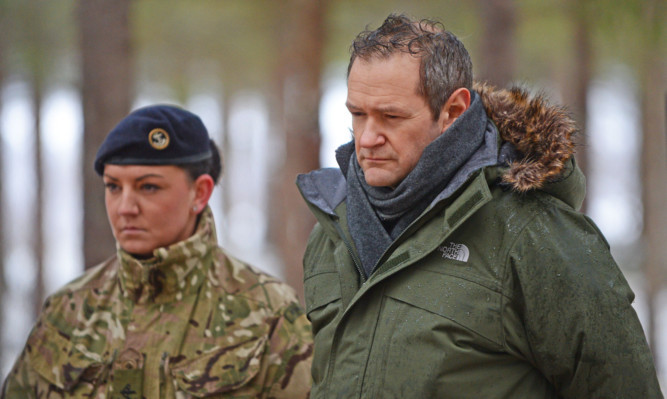TV star Alexander Armstrong has joined Angus-based Royal Marines on sub-zero exercises in Norway over the past month.
As part of 3 Commando Brigade, 45 Commando marines from RM Condor in Arbroath took part in an annual exercise, during which they learned survival skills in temperatures of -10C and winds of up to 120mph.
The marines of Whisky Company were joined by Pointless presenter Armstrong, who will travel around the Arctic Circle this year for an ITV show.
“It has been extremely instructive,” he said.
“We had to pay attention and learn because this is a real situation that we could potentially find ourselves in.
“If you give up out here you are going to last about an hour. That’s what you have to remember you have to strive in this environment, otherwise it’s curtains.”
The Royal Marines, who make up about 20% of the naval service, are in Norway to develop their cold weather warfare capability after more than 10 years in Afghanistan and Iraq, and the conditions in Norway make it the perfect environment.
In the exercise the marines are being taught how to survive, move around on skis and fight in the difficult conditions.
They must ski across mountains while carrying weapons and 70lb rucksacks, build makeshift shelters from brushwood and build fires to keep warm and cook their dinner. Food is usually chicken, which they must kill themselves, and vegetables they are taught to prepare with basic equipment.
Marines come every year to hone these specialist skills and are the UK’s only Arctic warfare-trained military force.
All must go through an ice-breaking ritual of skiing into an ice hole carrying two poles and a rucksack, then pulling themselves out with all their equipment.
Once out of the ice hole the marine has to recite their service number and name before asking for permission to leave the ice.
The aim is for each person to experience what it would be like if any of them fell through ice during Arctic warfare.
Major Steve Cox, who is in charge of the deployment, said: “If you can operate here you can operate anywhere and we proved this last when we used skills learned in Norway in the freezing mountains of Afghanistan in 2002.”
